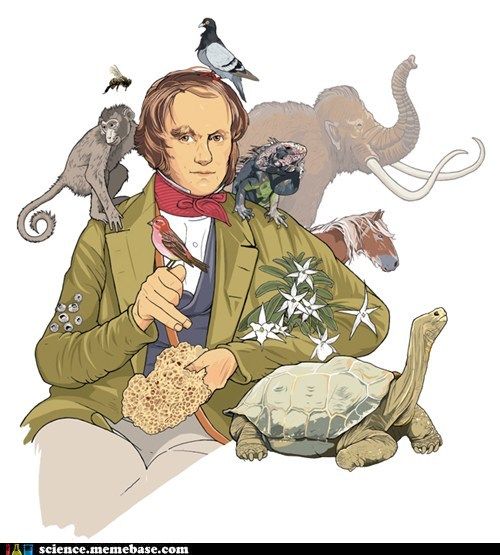What did Darwin do?

The image of Charles Darwin is buried under tons of both saint-making and vilification. In addition the peculiarities of his life, the massive shifts within his profession, and the vastly different interpretations of his work immediately after and long after the publication of The Origin in 1859.
Darwin was an unofficial naturalist when he set out on the Beagle and returned and worked for almost a decade before publishing his most famous book. The Origin was in his own view a bit of a rush job as he wanted to take more time on his ‘big species book’ but news of Alfred Russell Wallace’s similar theory of evolution prompted him to speed up matters.
The method of presentation of Darwin’s book is at odds with the textbook picture of him as having a eureka moment in the Galapagos islands and ‘discovering’ evolution. Nor can Darwin be easily folded into the ranks of either empiricism, mechanism, or materialism (understanding that those terms were starting to have a particular meaning in biology at the time. Darwin was a naturalist who became a theory-laden empiricist in part by hijacking the rhetorical modes of natural theology and analogical comparisons within common knowledge (especially animal breeding and training).
In other words Darwin uses a barrage of fine detail to marvel at the creations of nature but by using analogy to artificial selection (animal breeding) Darwin de-theologizes this wonder and reverses the emphasis – there is no singular force causing all these small changes instead these small changes are the force. As Stephen Jay Gould points out in his massive The Structure of Evolutionary Theory this allows Darwin to co-opt the argument from design without appearing to directly undermine a hands-off (Deistic) treatment of god and the creation of of the natural world. We could sum this all up in that Darwin’s closing attitude in the book is something like ‘isn’t is incredible that god could do something so ingenious and as simple as natural selection and make this wondrous world?’
Of course the elephant in the room is geological time against biblical time. By his own accounts few things haunted Darwin more than the possibility that the gradualist and long geological history needed for his long parade of infinitesimal changes was wrong (as Lord Kelvin famously claimed). But on this point Darwin’s materialism became the focus by way of Huxley – since Huxley spoke for Darwin and for the most controversial notion of common descent – as the upswing of deep time’s long long length.
The current legacy of Darwinism (in its most restrictive but most popular form) resulted from suspending the question of the complexity of causes around natural selection and through statistical analysis sought how to measure its effects. This tendency which was later combined with Mendelianism and then later with DNA analysis is often refereed to as genetic determinism but is in fact deterministic about the effects with retroactive causes that are never fully determined. This is in itself far more pernicious than determinism or teleology since it leaves open a degree of freedom which is technical but also apolitical.
This is why the ongoing battle in evolutionary theory is still over the unit of selection – of the consequences of shifting the unit of selection from the organism down to the gene. Much resistance to the notion that organisms are mere genetic vehicles (as Dawkins put it) is often dismissed as anti-Darwinian or politically motivated or as simply ‘a different way of looking at it’ But the fact that there is so much resistance to macroevolution and epigenetics is often put in terms that are clearly poliitcal/historical while the same geneticists deny that there is anything political about their ‘pure quantitative’ analyses of things like intelligence.
It’s possible that the most dangerous aspect of Darwin’s legacy is that he was agnostic about some things that his followers were very sure of and that still to this day there is not enough constructive betrayal of his ideas.
Filed under: Uncategorized | Leave a Comment
No Responses Yet to “What did Darwin do?”